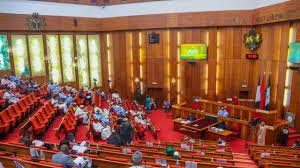[NOTES FOR A PRESENTATION AT A WEBINAR ORGANISED ON THE SAME THEME BY HIPCITY INNOVATION CENTER AND HENINRICH BOLL FOUNDATION: THURSDAY, MAY 14TH 2020];
SETTING THE CONSTITUTIONAL CONTEXT:
The local government Council as the third tier of administration in Nigeria is provided for in Chapter 1, Section 7 of the 1999 Constitution of the Federal Republic of Nigeria [CFRN] as amended.
Section 7 (1) provides that “The system of local governments by democratically elected local government councils is under this constitution guaranteed; and accordingly, the government of every state shall subject to section 8 of this constitution, ensure their existence under a law which provides for the establishment, structure, composition, finance and functions of such councils.”
Section 7 (3) further provides that “It shall be the duty of a local government council within the state to participate in economic planning and development of the area referred to in subsection 2 of this section and to this end an economic planning board shall be established by a law enacted by the state house of assembly of the state.”
Section 7, subsection 5 deals functions of the local government which are set out in the fourth schedule to the constitution; while subsection 6 deals with statutory allocation of public revenue to a local government by the federal government through the national assembly [subsection 6a]; and by the state government through the state house of assembly [subsection 6b].
In the fourth schedule to the 1999 CFRN as amended detailing the functions of the local government council, it is clear by many of the provisions of section in subsections a, c, e, h, and k, directly relate to maintenance of public health.
Section 2 of the fourth schedule goes on to make specific and deliberate provision for the role of local government in the provision and maintenance of health services [section 2 (c).
It is within this context that primary healthcare delivery and primary education is located within the direct purview of local government councils in Nigeria.
HEALTHCARE DELIVERY AND LOCAL GOVERNMENT ADMINISTRATION:
Within the context of the constitution, the local government area is expected to play a decisive and mandatory role in the economic, social and political development of the state of which it is a part. It is intended, given the absence of community administration, to be the closest tier of government and public administration to the people.
Central to this expectation is its mandatory role in the economic planning and development board of the state, delivery of primary education, and the delivery of primary healthcare within the state.
Its role in primary healthcare delivery is thus essential and key to the effective deployment of the three-tier healthcare delivery architecture of the country vis-à-vis primary, secondary and tertiary healthcare. It is instructive to note that this role within a three-tier architecture of service delivery is similar to that in education service sector as well.
And in the management of infectious diseases, an efficient, effective, and qualitative primary healthcare system is the corner stone of preventing epidemics and pandemics, and diagnosing and offering immediate treatment of cases, and ensuring the resilience of the healthcare delivery system in the face of major outbreaks of epidemic or pandemic proportions.
Such a system, to be effective will require to be well funded, adequately resourced, well equipped, and well-staffed by appropriate, qualified, trained and competent healthcare personnel. It must also have in place an efficient and effective referral system linking it proactively with secondary and tertiary healthcare delivery facilities and systems. Without these the public healthcare delivery system will be dysfunctional and will be standing on shaky and faulty foundations.
COVID 19 AND LOCAL GOVERNMENT ADMNISTRATION:
With respect to the COVID 19 Pandemic, the local government council, ought to be able to play a significant role in all the major areas of manifestations of the pandemic, including in public health sustenance, mitigation of economic impact through support to MSMEs; mitigation of impact on livelihoods and food security of citizens and residents through targeted equitable and socially inclusive distribution of palliative measures; as well as within the context of maintaining security and enforcing the COVID 19 Response measures in humane ways through the operation and management of community volunteer units etc.
CHALLENGES FACING LOCAL GOVERNMENT ADMINISTRATION IN THE FACE OF COVID 19:
1. Local councils are under resourced both in terms of adequate funding and competent personnel;
2. Undue interference of state governments in the affairs of local government councils, constraining the ability of the councils to be innovative, creative and autonomous in the management of the local governments, in turn undermining their capacity to deliver effectively on their functions;
3. Lack of accountability and transparency on the part of local government administrations with respect to their responsibilities to residents, as well as observance of rule of law and operations of the system of checks and balances between legislative and executive arms of the administration, and between the administrations and the local communities within the local council area.
4. The parlous state of primary healthcare and the near prostrate nature of primary healthcare centers across the country.
LESSONS FROM COVID 19: RETHINKING LOCAL GOVERNVENT ADMINISTRATION;
It is clear that from the way and manner that the COVID 19 Pandemic has manifested, and from the nature of the response to it so far that the following key lessons required to be learned and drawn:
a. Universal access to healthcare delivery is central to tackling and combating infectious diseases, and universal access to quality primary healthcare is at the heart of universal healthcare delivery;
b. Local governments being directly responsible for primary healthcare delivery require to be retooled, and adequately resourced to deliver on this mandate;
c. Universal access to public humane and habitable housing is pivotal to ensuring public and personal hygiene and sanitation, and in ensuring access to clean portable water; all of which are essential for maintaining good public health;
d. Local governments need to be enabled to play their central role in ensuring quality housing, and quality livelihoods of residents through the radical overhaul of their structures, the upgrading of their systems, and the training and retraining of their personnel;
e. Concerted efforts need to be exerted to ensure that the constitutional provisions relevant to the local government administration are enforced, complied with, and adhered to by all relevant authorities;
f. From the management of the COVID response thus far it is clear that records keeping is of existential importance to the modern state. The local government administration in its role in registration of births and deaths, and of marriages, as well as licensing of markets and registration of some businesses is core to the evolution and development of a biometric state which is key to effective delivery of basic social services in health, education, housing, energy, transport, etc. If we had accessible records, that are efficiently managed, and regularly updated, it would be much easier to undertake contact tracing and tracking, to stop community transmission, to ensure appropriate targeting of palliatives and stimulus packgaes, etc.























